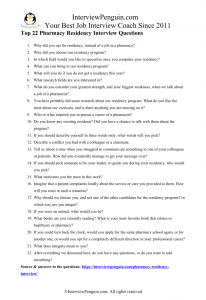Residency will give you a head start to your professional career in pharmacy. It will allow you to work under a guidance of an experienced professional, and explore different career paths in the field, eventually finding the right match for your skills, goals, and personal vision. Let’s have a look at 23 questions you may face while trying to succeed in this tricky interview.
Table of Contents
Why did you opt for residency, instead of a job in a pharmacy?
Most pharmacists find themselves in quite a big debt, once they finally earn their degree, and are qualified to start working in the field. So why would you opt for a residency program, earning barely $50K a year, when you can get a job in a pharmacy at the corner, earning twice as much?
The right answer is long term goals, and vision you have for your career. You do not want to be just an average pharmacist. You want to know more than the others, find your specialization, your true calling. The experience from the residency program will set you apart from pharmacists who applied for jobs straight away. And one year or two years is nothing in the scope of your entire life and professional career.
Why did you choose our residency program?
Try to connect your choice with your future. If you applied for a program in a hospital setting, you perhaps aim for Board Certification in Pharmacotherapy Specialty, or see yourself working in a hospital in the future.
If you applied for a residency program in a community pharmacy setting, that’s perhaps the sector in which you see yourself working for the rest of your professional career.
You should also say something nice about their program. Perhaps you talked to some pharmacists who went through it and got a good recommendation, or they have an excellent reputation, or you like the structured rotations in pharmacy practice, education, research, and administration they offer to the residents.
Try to be specific in your answer. Pointing out one or two courses from their curricula will clearly show the interviewers that you did your homework, and do not apply with them just because you didn’t get accepted anywhere else, or didn’t know what to do with your life at this point.
In which field would you like to specialize once you complete your residency?
You have two options for a good answer. One is saying that you haven’t decided yet about your specialization, or place of work. That’s exactly the reason why you apply for a place in their excellent residency program. It will allow you to explore different paths in Pharmacy, and make a more qualified decision at the end.
Another option is picking a specific field, such as Critical Care, Drug Information, Infectious Diseases, Internal Medicine, Managed Care, Nuclear Pharmacy, Nutrition Support Pharmacy, or others, and explaining that PGY1 and PGY2 residency is your best way to dive into the field, and to become qualified to apply for the job in the field of your choice later on in your career.
What can you bring to our residency program?
Just like everything else in life, residency program is about both taking and giving. They are looking for a new team member, someone who can bring something onboard, be it only a nice smile and positive energy.
You can refer to several things in your answer:
- Motivation, commitment, and honest desire to learn and to become a valuable member of their team.
- Best GPA and excellent results from school.
- Creative mind and innovative ideas–maybe they can also learn something from you.
- Right attitude to work and strong work ethics, they can rely on you in all circumstances.
Regardless of what you opt for in your answer, they should get an impression that you do not want only to benefit from your residency. You also want to give something back. Such an attitude can win you their favor and a place in their program.
What will you do if you do not get a residency this year?
The key is to show them that while you have a plan B, residency is really important to you, and you will continue trying. I mean, if you said that if you do not get a residency, you will simply apply for a job of a pharmacist in a supermarket and forget about residency, you would not help your chances to succeed in this interview. On the contrary.
You can say that you will try to get a job (you have to live from something after all, and do not want to waste one year watching Netflix), but at the same time you will apply for residency next year, and you will try to prepare better for the interviews.
Alternatively you can suggest making a gap year, traveling the world, perhaps learning how pharmacy works in different corners of the world. Broadening your horizons and learning something about the other cultures, you will come back smarter, humbler, and more eager than ever to get the residency. Or you will never come back, that’s also always an option when you go to travel the world :).
What research fields are you interested in?
Research is an important part of each good residency program. And you should have a plan, you should know what you want to work on. At least that’s the impression they should get while talking to you in this interview.
Perhaps you can continue in the research you did as a part of your thesis, or, even better, have a look at some research projects they work on in the program, latest academic papers they published. Read the abstracts and find something that resonates with you–some study, hypothesis, or team you’d like to join.
You can even refer to this as a reason why you chose their residency program–because their research work matches your research interests.
Other questions you may face in your pharmacy residency interview
- What do you consider your greatest strength, and your biggest weakness, when we talk about a job of a pharmacist?
- You have probably did some research about our residency program. What do you like the most about our curricula, and is there anything you are missing on it?
- Who or what inspired you to pursue a career of a pharmacist?
- Do you know any existing residents? Did you have a chance to talk with them about the program?
- What three words would your friends use to describe you?
- Describe a conflict you had with a colleague or a classmate.
- Tell us about a time when you struggled to communicate something to one of your colleagues or patients. How did you eventually manage to get your message over?
- If you should pick someone to be your leader, to guide you during your residency, who would you pick?
- What motivates you the most in this work?
- Imagine that a patient complaints loudly about the service or care you provided to them. How will you react in such a situation?
- Why should we choose you, and not one of the other candidates for the residency program? In which way are you unique?
- If you were an animal, what would you be?
- What books are you currently reading? What is your most favorite book that relates to healthcare or pharmacy?
- If you could turn back the clock, would you apply for the same pharmacy school again, or for another one, or would you opt for a completely different direction in your professional career?
- What does integrity mean to you?
- After everything we discussed here, do you have any questions, or do you want to add something?
Special Tip: If you are new to the world of interviewing for jobs, and do not know how to handle these tricky and scenario-based questions, have a look at our Interview Success Package. Up to 10 premium answers to all questions from the list (and other questions you may face) will help you streamline your interview preparation, stand out on the big day, and secure your place in their residency program. That you for checking it out!
Conclusion, final thoughts
Pharmacy residency interview belongs to tricky interviews. The list of possible questions is quite extensive, and the interviews do not really have a standard format. They may ask you fifteen questions from this list in one place, and sometimes they may ask you just five questions.
The best thing you can do to prepare for your residency interview is to conduct an extensive research about the program. The subjects of study, the research they work on, leading figures, information from the former or present residents.
Of course, if you have an opportunity to talk to someone who interviewed for the place in their program before, you can ask them about the questions, and prepare better. But if you do not have such a contact at your disposal (which is likely the case), you have to rely on your research and preparation for a variety of questions you may possibly get… If you experience anxiety or aren’t sure how to proceed, check our Interview Success package and streamline your preparation.
Thank you for reading and good luck in your interview!
Matthew
* You can also download the full list of questions in a one page long PDF, print it, and practice your interview answers anytime later:

May also interest you:
- Psychiatry Residency interview questions.
- Pharmacy School interview questions.
- Walgreens pharmacist interview questions.


